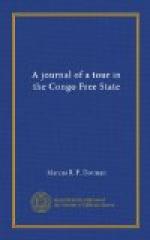Lord Mountmorres is now anxious to hasten to Bumba for the rest of the mail and if necessary to send a special courier to Coquilhatville with a cablegram while I arrange to follow more slowly and hunt the country in between. He therefore leaves Djabir on October 31st taking only one boy and a little baggage. It is a very hot day and at night-time a heavy tornado bursts over the Post. I wake up in a pool of water for the roof leaks badly and by bad luck just over my bed. Having moved this to a dry spot it is possible to sleep but not for long for the mosquito net was fixed to the wall where I left it forgetting the little pests. It is now a question of bites or water and as the latter seems cooler I replace the bed and fixing the roof of the net on the slope so that the heaviest part of the shower will run off, pass the rest of the night in comparative comfort. It is indeed time the place was rebuilt for at present Djabir has a depressing air of former greatness and present decay. As there are no elephants near and the antelopes are very small, I arrange to leave on November 1st but on starting to repack find many of the antelope skins are rotten and order them to be thrown away while the native lances and spears are covered with red rust, and have to be cleaned, smeared with palm oil and repacked.
I start next morning to cross Uele, but as it is impossible to obtain more than thirty five porters some of the baggage has to be left behind. The loads are carried here in rather a curious manner. The porters make a hand of coarse grass fibres and pass it over the crown of the head which is inclined forwards. The band is attached to the bale or box which itself rests on the back between the shoulders. Then leaning forward the porter, carrying 50 lbs, walks at 3-1/2 miles an hour over rough roads for three or four hours with scarcely a stop. Having crossed the river the caravan is formed and at once strikes along the path through the villages on the opposite bank to Djabir.
We are now on a frequented route and the villages and people show far more signs of the influence of the white man than those on the Ubangi. The huts are square, thatched with leaves and have verandahs while most of the men and many women wear clothes. The tatouage also is here very different for the vertical line on the forehead is not seen and a horizontal line of small elevations just above the level of the eyes is very common; there are however, various other devices on the cheeks and the lobes of the ears are sometimes pierced for the insertion of a ring of ivory nearly as large as a serviette ring. The natives are very polite, every single one giving a salute so that at the end of a long village one’s arm aches with returning it. Chicken and eggs can be bought here for cloth at about the price one pays in an expensive shop in London. Some of the natives said nothing and were satisfied while others grumbled but did not take back their goods. One man sold nine eggs for about 2/- of which only three were fit to eat and demanded 4/- for a chicken little larger than a pigeon.




